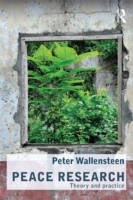Comprising essays by Peter Wallensteen, this book presents an overview of the thematic development of peace research, which has become one of the most dynamic and innovative areas of war and conflict studies.
Peace research began in the 1950s when centres were formed in the USA and Europe, and today there are research institutes and departments on every continent, with teaching and research programs in most countries, and peace researchers contribute to the development of international studies, development research and security analysis. Prof. Wallensteen has been a witness to much of this since forming the Department of Peace and Conflict Research at Uppsala University in the late 1960s, and this book brings together thirteen of his articles with five new essays in one volume.
The book presents articles on such key issues in peace research as the causes of war, conflict data, conflict diplomacy, non-violent sanctions and third- party diplomacy. In this way, it demonstrates how basic research can be conducted in fields often seen as 'unresearchable' and 'too complicated to deal with'. This volume shows that it is a matter of developing definitions, creating valid measures and finding ways of collecting information, recognising that innovations of this kind require supportive research environments. Furthermore, the results are not only useful for the growth of research activity itself, but for finding ways of dealing with actual conflicts. Thus, attention is also paid here to conflict prevention, peace agreements, sanctions and third-party activity for preventing and ending armed conflict, and building a lasting post-war peace.
This book will be of great interest to all students of peace studies, conflict resolution, war and conflict studies, development studies and IR/security studies in general.

